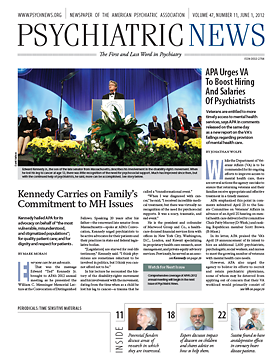Cortex Volume Abnormalities Predate Cannabis Use
Researchers at the Orygen Youth Health Research Centre at the University of Melbourne and the Turning Point Alcohol and Drug Centre in Fitzroy, Australia, believe that some of the regional brain-volume alterations seen in long-term, heavy cannabis users might predate cannabis use and represent markers of vulnerability, rather than being due to the drug’s neurotoxic effects.
They enrolled 121 primary school students as part of a larger study examining adolescent emotional development. The students underwent structural magnetic resonance imaging at age 12 and were assessed for cannabis use four years later. At that time, 28 had begun using cannabis, and 93 had not. Smaller orbitofrontal cortex volumes—but not the volumes of other brain regions, including the amygdala, hippocampus, and anterior cingulate cortex—predicted cannabis use by age 16.
The researchers believe their results “provide evidence that some structural abnormalities observed in cannabis users might exist before exposure and suggest that alterations in regions that underlie inhibitory and decision-making processes might influence risk for early cannabis use.” Their work also supports recent findings that structural changes in the amygdala and hippocampus are a consequence of chronic cannabis exposure rather than a premorbid vulnerability.
Cheetham A, Allen N, Whittle S, et al. “Orbitofrontal Volumes in Early Adolescence Predict Initiation of Cannabis Use: A 4-Year Longitudinal and Prospective Study,” 2012. Biol Psychiatry 71(8):684-692. www.ncbi.nlm.nih.gov/pubmed/22129756 Statin Drugs May Affect Depression
New data suggest that hydroxymeth-ylglutaryl-CoA reductase inhibitors, otherwise known as statins, are beneficial for more than their cardiovascular effects. Among the most commonly prescribed medications, statins might also exert antidepressive effects.
To evaluate the association between statin use and depressive symptoms, researchers at the Veterans Affairs Medical Center in San Francisco assessed statin use in 965 outpatients from 12 clinics in the San Francisco Bay Area. All had stable coronary heart disease and had their depressive symptoms measured annually for six years.
Statin use was associated with 34 percent decreased odds of exhibiting depressive symptoms during six-year follow-up after adjusting for potential confounding variables in patients with coronary heart disease. Among patients free of depression at baseline, statin use was associated with 38 percent decreased odds of developing depression. But “our observational data cannot infer causality, which would need to be proven by a randomized controlled trial,” wrote the researchers. They noted that it would not be possible to randomize patients with established coronary heart disease to placebo, given that statins are recommended for secondary prevention.
Otte C, Zhao S, and Whooley M. “Statin Use and Risk of Depression in Patients With Coronary Heart Disease: Longitudinal Data From the Heart and Soul Study,” 2012. J Clin Psychiatry. Feb 21 [Epub ahead of print]. www.ncbi.nlm.nih.gov/pubmed/22394433 CBT Without Medication Leads To Remission in Adult ADHD
Cognitive-behavioral therapy (CBT) is an effective treatment for attention-deficit/hyperactivity disorder (ADHD) in adults, but medication doesn’t significantly enhance the outcome of CBT. Researchers based at the University of British Columbia have published the results of a secondary analysis comparing 23 participants randomized to CBT plus dextroamphetamine with 25 participants randomized to CBT plus placebo.
Both groups showed robust improvement in symptoms and functioning, but the use of medication did not significantly improve the outcome over and above use of CBT and placebo.
CBT was administered individually for nine sessions. Patients had to attend a minimum of eight of the nine sessions and take 80 percent of the medication to remain in the protocol. Patients received a comprehensive evaluation at baseline and 15 and 20 weeks later to determine if there was a lag effect differentiating psychological and medication treatment. All patients showed significant improvement, going into remission and maintaining those gains over the 20 weeks.
Their results, said the researchers, suggest that CBT can be effective in adults with ADHD, even in patients who are not able to use stimulants.
Weiss M, Murray C, Wasdell M, et al. “A Randomized, Controlled Trial of CBT Therapy for Adults With ADHD With and Without Medication,” 2012. BMC Psychiatry. Apr 5 [Epub ahead of print]. www.biomedcentral.com/1471-244X/12/30/abstract Implanted Naltrexone Treats Polydrug Addiction
Available treatments for opioid dependence present multiple problems. Substituting another opioid (methadone or buprenorphine) for the opioid of abuse can lead to dependence on the replacement. The opioid receptor antagonist naltrexone has been used for treatment of both alcohol and opioid dependence, but oral naltrexone has proved ineffective because of poor treatment adherence. And there is no effective pharmacological treatment now available for polydrug dependence.
A group of Finnish researchers suggests that a sustained-release form of naltrexone—known as Prodetoxon and administered as a surgical implant— may overcome these obstacles. They assessed the effectiveness of the implant in the treatment of coexisting heroin and amphetamine dependence in 100 heroin- and amphetamine-dependent outpatients in a 10-week randomized, double-blind, placebo-controlled trial. Outcome measures were retention in the study, proportion of drug-free urine samples, and improvement score on the Clinical Global Impressions Scale.
Their results indicated that patients implanted with naltrexone had higher retention in the study, decreased their heroin and amphetamine use, and had improved clinical conditions. The implant was also generally well tolerated. The researchers, whose prior work led to Food and Drug Administration approval of the injectable depot formulation of naltrexone known as Vivitrol, said their current findings are “the first evidence of an effective pharmacological treatment for this type of polydrug dependence.”
